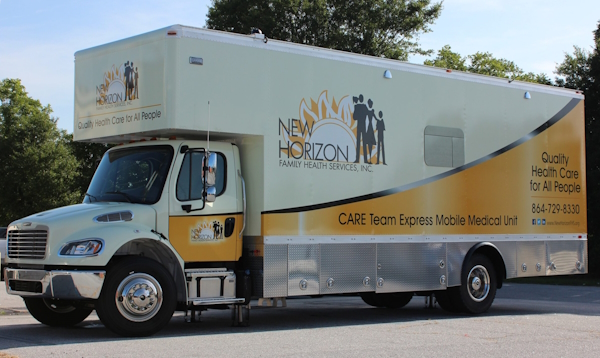What: New Horizons Family Health Services, Healthcare for the Homeless – Mobile Medical Unit (MMU), is a 35’ doctor’s office on wheels with 2 exam rooms, the ability to draw patient labs, and staffed with a medical provider and clinical staff. A smaller unit with one room will be launching soon, once it is fitted and staffed.
Who: The MMU provides primary care services to patients experiencing homelessness.
Where: Upstate South Carolina, which is comprised of 13 counties.
When: New Horizon Family Health Services, HCH program was launched in 2005.
Why: The HCH program was started at New Horizon Family Health Services to address the lack of accessible primary health care services to individuals experiencing homelessness.Individuals experiencing homelessness are beset with medical problems, which either go untreated, become acute and are treated with emergency services, or are treated at the emergency department instead of a primary care facility. This situation is unsatisfactory both for the individuals, whose medical needs are not being adequately met, and for medical systems and society at large, who are left to absorb the cost. The goal is to provide both preventative and primary care, improving overall health.
How: The program is funded through Health Resources and Services Administration (HRSA) which is a part of the Bureau of Primary Health Care (BPHC) which is a part of Health and Human Services (HHS). When the need was identified, New Horizon applied for a grant through (HRSA) which funds the 330h part of Title 42.
The origin of this funding goes back to 1984, when the Robert Wood Johnson Foundation and the Pew Charitable Trust took applications from 50 of the most populous cities across the US. These cities were invited to apply for a 4-year grant that would support health care delivery to people experiencing homelessness. In 1985, 19 projects were chosen and ultimately served as the model for the more than 300 programs we have across the country today. In 1987, the McKinney Vento Assistance Act was passed, in which Title VI of the Act established the Healthcare for the Homeless program as the only federal program with the responsibility of addressing the healthcare needs of people experiencing homelessness.
ProTips: It is important to include many partners and stakeholders in the conversation. It is also crucial to conduct a community needs assessment and make sure the work isn’t already being done to avoid duplication of efforts. If the need is not being met, having stakeholders be a part of the conversation will ensure you are not working in a silo and will allow for the development of important partnerships that will help address the need. For example, to start providing primary care services or expanding access to primary care services for people experiencing homelessness, it would be beneficial to convene the local community health center, free clinic, even the emergency department or the health department to understand who is providing what services, understanding the gaps, and then working together to determine which organization is best suited to address the need and how. It is important that strategies are constructed with everyone at the table.
On the smaller, more detailed level, it is worth knowing that maintenance on mobile units can be costly and time consuming. It is imperative to have a maintenance program established so routine things do not become mobile unit crippling problems later. Whether there is a mechanic on-site or you partner with a local shop, the key is to have preventative maintenance in place. Poor maintenance can ground the mobile part of your mobile program for extended periods of time and prevent your program from being able to provide services to folks in a predictable and consistent way. Also, having a bathroom on a mobile unit will increase the need and frequency of routine maintenance.
The HCH program has had three MMUs since launching in 2005. The first MMU was a donation from one of the local hospitals (an example of how including stakeholders in the conversation can be beneficial). However, due to its already advanced age, this unit was only operational for about 3 years. The second unit was also a used unit. It was purchased and used for about 10 years. The latest unit has been in operation since 2019 and was purpose-built to HCH’s specifications thanks to funds accessed through a federal grant. Mobile medical units that cover multiple sites across multiple counties can pack on the miles in short order and are used heavily, causing a lot of wear and tear (which is why a consistent maintenance program is so important).
Meaningful Stats: The MMU goes out4 days a week, for an average of six hours per day of providing primary health care services to people experiencing homelessness in emergency shelters and day shelters. (Drive time, set-up, and takedown take up the rest of the day.) In 2022, more than 800 patients were treated and provided close to 1,000 medical encounters.

